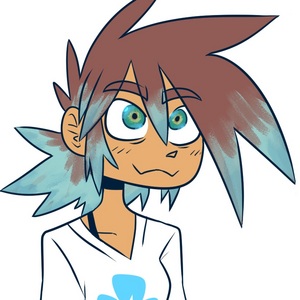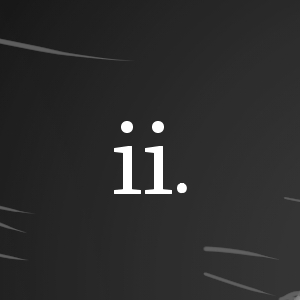While passing through a town, half-way to the coast nearest England, I was told to hide in the cart, and not make a sound. The jockey didn't want anyone knowing he was transporting a passenger, or there'd be extra tariffs at one of the toll-bridges. Those tariffs were meant to keep the bridges fixed, but usually went into wishing wells and the bottoms of mugs. As we crossed a particularly rickety mess of planks, I kept my mouth shut and covered myself with a spare blanket, pretending to be a lump of bundled leather. I'd plenty of practice at being unseen, thanks to my cruel, unseemly relatives back home. As one of the milk barrels turned to salted cheese right next to me, I scrunched up my face and 'blagh'd'. I'd only just gotten out of a place where I'd been forced to smell worse, every single day: the Beckenov home. Or I suppose, for me, it was only ever just a house.
When my parents died, I was no longer allowed by The King to live by myself in my old home. He didn't want to put me out, but he didn't exactly take me in, either – he was still sore about his sofa. Legally, I couldn't lay claim to my own house, nor its lawns, until I was fifteen years of age. I was only eleven at the time. So across the village on the watery side, I was made to keep with the Beckenovs. They were, as I was told by The King, my true grandparents by blood; the reason I'd never met them is that he didn't like them very much. On first impression, I believed this was rather marved of him, but on second, I saw what he did. They were rude, overweight, and brought dirt wherever they went. Still, they were family! Which was news to me. We introduced ourselves with a handshake and a hug, and they told me their names. I promptly forgot their names, but that was probably fine, because grandparents are only called 'grandmom' and 'granddad', anyway. I'd have to ask them again, some time later.
We left the castle town by a two-horse carriage, rode back to the village, and stopped at my father's house. At least, who I was accustomed to calling my father, anyway. As I collected my things, it occurred to me I should ask how we were related, and which of their children grew up to be my parent, and on which side; but when I got back in the carriage, and asked about it, they gave no indication they could hear me. I spoke up, and they said I was too quiet. I tried to ask a third time, and then they started making fun of me – calling me 'mumbles', and saying I should put up an act for coin on the street. It made me feel small, but I figured myself tough to it.
The house wasn't far off from mine, and it was a sight to behold: a quaint-seeming, stone-based, birch-logged cabin of six bedrooms, nine closets, and every other room you could think of. A kitchen, a living room, a basement suit with its own faucet, a gaming room, and even a place just for shelving cold food. We had a cold box made of stone, under the counter, on a little wheeled cart – it needed to be filled with snow so the fish inside wouldn't rot. They had an entire scullery, big as my bedroom back home, cold as a mountain-peak in the summer thanks to a heat-vent built up through the ground above it. It was grated finely, so nothing could sneak in and steal their wares; save for spiders who did no harm but to flies that wandered in. The only problem with the home was that the landscape was utterly falling apart. The disarray came from boggy puddles, overgrown grass, splintered staircases, falling trees, and threateningly jagged stumps.
On the task, bravely, were my grandparents, and their big white dog, Thunder. Now I've got to describe my relatives to you, in greater detail – as is done in these types of books. When I was younger, The Mentor had shown me portraits of people from all over the world, and tested me to recognize them by continent – I'd become pretty adept by the time he passed on, and stopped receiving new ones by letter.
He'd even once said, "The child possesses an uncanny knack for guessing the origin of a face, even though he no idea to whom it belongs."
So, without further ado: I observed my grandmother to be a large woman of fifty years, pale but African-faced with narrow, kindly-seeming eyes and a curled, big-lipped smile. Her hair was a wavy-curled brown and grey, but she'd been dyeing it with henna. She appeared, as far as I could tell, to be Mayan (or somewhere near), as well as English, French, Russian, German, Scottish, and probably Irish. She was a cousin of The Mentor's son, and Egyptian as well. She had a frown that didn't seem to leave. My grandfather was a burly but slow-moving old man, with a low, low growl of a voice. But he mostly used it to tell jokes, and comfort small children, with whom he was locally famous. He was in his late forties, yet somehow, looked even older than his wife. The old man was strong, but more-so of frame than of mind. Wide-bodied, and thick of skin. He seemed to be from Northern Africa, The New World, Arabia, and possibly Scotland. More than anything, he had about him a tropical lax, but I didn't know where that would put him. Similar to the Mayans, but more... blunt, and barreled at the chest. I didn't know the entire world, and not every sailor who voyaged came back with a story, let alone a portrait. Either way, his face was a burnt orange, and usually covered in black-grey prickled hairs, and leftover food. Finally, the dog was big, white, fluffy, and very, very friendly. At least, towards me. He was also a bit lionesque, if I do say so. It seemed he had a distrust of adult men, but which didn't extend to my grandfather. I hoped that when I got a bit taller, he wouldn't start to bite... but he didn't look the type.
My grandmother was responsible for two things, actually: tax accounts for the entire village's agriculture, and keeping the stove hot with dinner. After that, she'd retire to bed early, and wake up fore dawn to 'crack at' once again. She'd be wearing full makeup and a housecoat before anyone else was even conscious, already cooking breakfast for herself and more. I called her The Rationner. It was my grandfather's job to purchase groceries from the stands using his incredible wealth from his faraway career making barrels in Germany – he was only ever around four times in four years, for about a month or two each time. I called him The Barreler. At first, I found him witty, observant, and sensitive to those around him – but over time, I started to see that something disturbed was coming over him, and his sense of humor was warping into a lack of self-control. It took only days for the change to find him. As well, The Rationner was becoming less kind, less charitable, and less patient with her own memory – forgetting more and more by the days. She wanted a 'fair share' of rent from me, but also wanted unwavering manual labor for the grounds – the kind that grown men do for pay they can buy a house with. He as well, soft though he seemed at first, was quickly becoming an overbairing presence, and alcohol was well in-hand on both sides if he could help it. It was apparent that I'd caught them during some kind of downturn in their lives, for each day they were less welcoming than the last.












Comments (0)
See all